Stories of kindness in the Bible reveal timeless lessons on compassion and empathy, inspiring acts of generosity in our modern world.
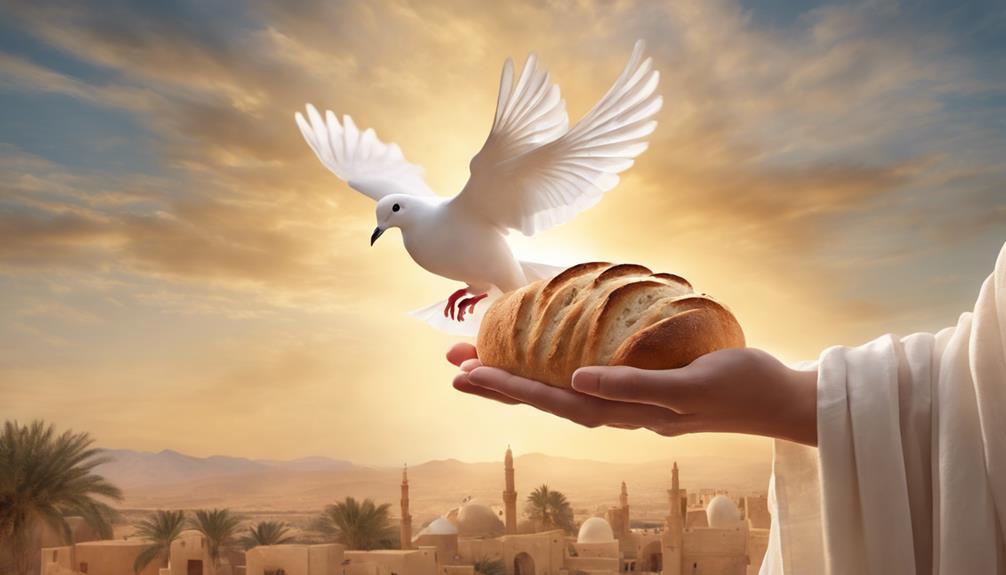
Stories of Kindness in the Bible
In the age of social media, it's easy to overlook timeless examples of kindness that don't trend online but have shaped moral compasses for centuries.
You'll find these stories nestled within the pages of the Bible, where acts of generosity and forgiveness leap from the text and ask you to reflect on your own life.
From the Good Samaritan's unexpected mercy to Boaz's generosity towards Ruth, each narrative offers a unique lens on compassion and empathy.
As you explore these tales, you'll discover lessons on kindness that remain profoundly relevant today. Curiosity might just reveal how ancient wisdom can inspire modern acts of kindness in your own life.
Key Takeaways
- The Bible highlights acts of kindness, such as the Good Samaritan, as models of compassion and mercy.
- Generosity, like Boaz's to Ruth, demonstrates the impact kindness can have on individuals and communities.
- Stories of forgiveness, such as Joseph's reconciliation with his brothers, underscore the healing power of mercy.
- Jesus' healing acts teach the values of empathy, hope, and the transformative nature of kindness.
The Good Samaritan's Mercy

In the parable of the Good Samaritan, Jesus masterfully illustrates the profound impact of unconditional mercy on societal barriers, challenging us to transcend our prejudices and extend kindness to all, regardless of our differences. This narrative not only showcases the essence of compassion but also profoundly influences the cultural perceptions of community and altruism. The Samaritan's actions dismantle the conventional boundaries of neighborliness, suggesting that acts of kindness shouldn't be confined by ethnic or religious affiliations.
Analyzing this parable, you'll notice its significant cultural impact, particularly on the neighborliness concept. It teaches that your 'neighbor' isn't just someone who lives nearby or shares your beliefs but is anyone in need of help. This broadened interpretation of neighborliness has inspired countless individuals and communities to adopt more inclusive attitudes towards kindness and assistance.
Moreover, the Good Samaritan's mercy serves as a pivotal example of how empathy and action can bridge the deepest of divides. It encourages a reflective examination of one's own capacity for prejudice and apathy, urging a more empathetic and proactive approach to the suffering around us. Through this lens, the parable becomes a timeless call to action, advocating for a society where compassion transcends all barriers.
Boaz's Generosity to Ruth
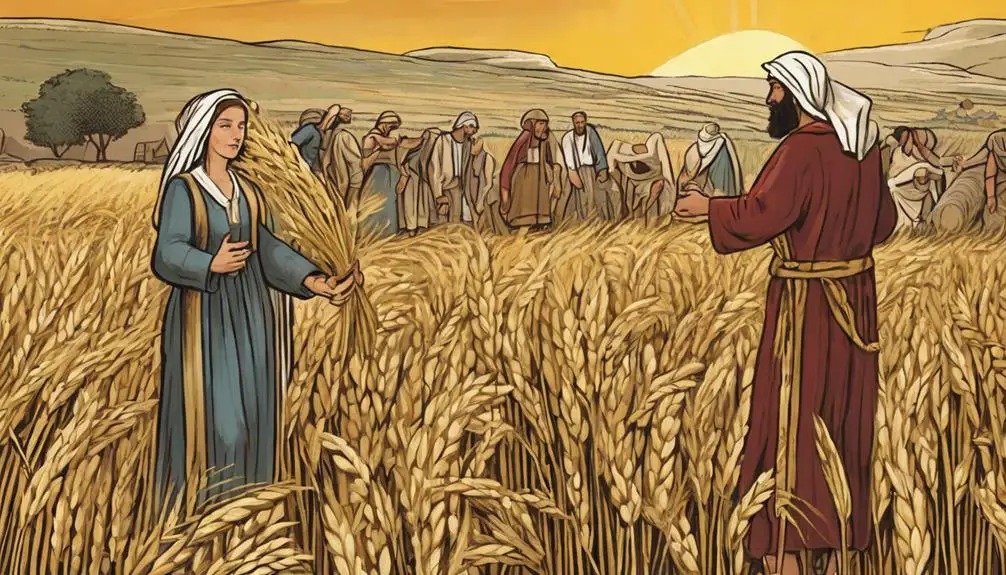
Delving into the narrative of Boaz's generosity towards Ruth, we uncover a compelling illustration of benevolence that transcends societal norms and legal obligations, inviting us to reconsider the dimensions of kindness and support within our own communities. This story not only highlights Ruth's loyalty to Naomi but also Boaz's adherence and extension of the Harvest laws.
Aspect |
Significance |
|---|---|
Ruth's Loyalty |
Ruth's unwavering dedication to Naomi sets the stage for her encounter with Boaz. Her commitment to Naomi, even in the face of hardship, demonstrates a profound expression of loyalty and love. |
Harvest Laws |
Boaz goes beyond the required actions dictated by the Harvest laws, instructing his workers to leave extra grain for Ruth to gather. His actions reflect an understanding that the law serves as a foundation for kindness, but true generosity requires a personal commitment to go further. |
Boaz's actions offer a deeper insight into the nature of kindness. He doesn't merely observe the letter of the law; he embodies its spirit, enhancing Ruth's ability to care for Naomi and herself. His generosity, rooted in both adherence to cultural norms and personal conviction, provides a powerful example of how extending support can significantly impact individuals and communities.
Joseph Forgives His Brothers
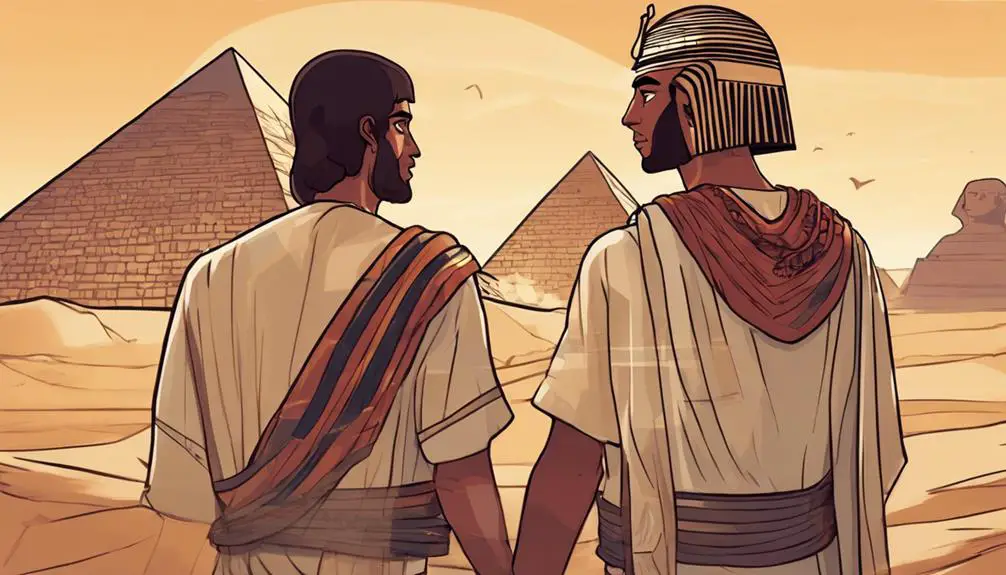
Amidst the complexities of familial betrayal, Joseph's decision to forgive his brothers stands as a profound testament to the power of mercy and reconciliation. This narrative not only underscores the significance of family reconciliation but also highlights Joseph's remarkable ability in dream interpretation, which ultimately positions him to save his family and many others from famine.
Analyzing Joseph's journey, you'll find several pivotal moments that illustrate the essence of forgiveness and the intricate dynamics of human relationships:
- Joseph's resilience: Despite being sold into slavery by his own brothers, Joseph rises to prominence in Egypt, showcasing the strength that comes from forgiveness and forward-thinking.
- Dream interpretation skills: Joseph's astute interpretations of dreams not only save Egypt from a devastating famine but also pave the way for his eventual reconciliation with his family.
- Strategic patience: Joseph carefully tests his brothers' characters before revealing his identity, demonstrating wisdom and patience in seeking genuine family reconciliation.
- Emotional reunion: The climax of Joseph's story is his emotional reunion with his brothers, where he openly forgives them, highlighting the transformative power of mercy.
Joseph's story teaches that forgiveness can bridge the deepest divides, restoring broken relationships and bringing about healing and unity.
The Widow's Offering
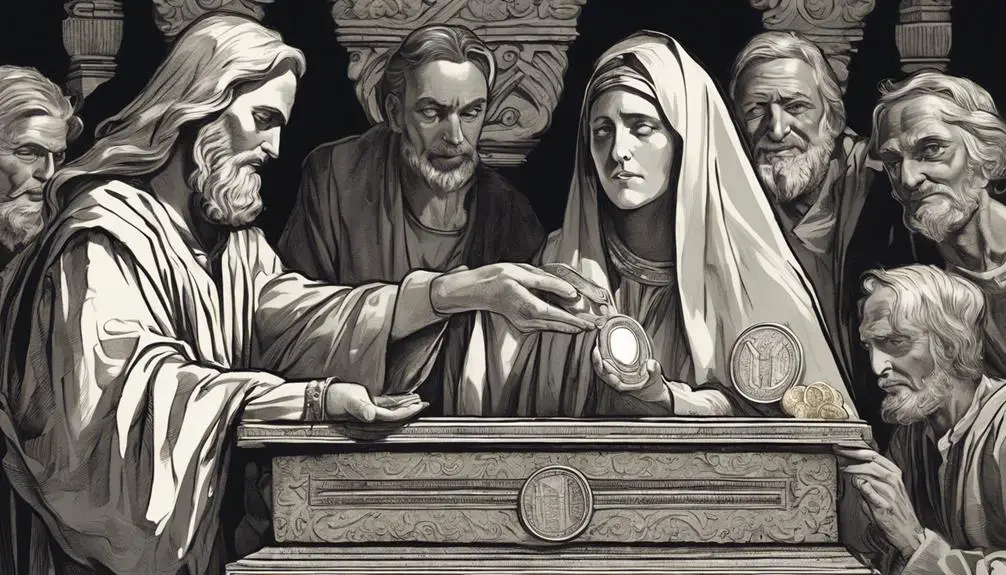
Shifting focus from the profound narrative of forgiveness in Joseph's story, we now explore the tale of the Widow's Offering, a powerful illustration of sacrificial generosity and faith. This narrative, nestled within the texts of the New Testament, showcases not the magnitude of one's gift but the heart behind it. The widow, with her meager offering of two small coins, epitomizes the essence of sacrificial giving. Unlike the affluent who contributed from their surplus, her donation, though seemingly inconsequential, represented her entire livelihood.
Analyzing this story, it's evident that the true measure of generosity lies not in the sum, but in the sacrifice involved. The widow's act of giving, though financially minimal, was spiritually maximal. This starkly contrasts with the societal norms that often equate generosity's impact with monetary value. Her story redefines generosity, emphasizing that its impact is magnified when it's a product of faith and surrender.
This narrative invites a reflection on the nature of our own contributions. Are they reflective of genuine sacrificial giving, or do they merely skim from our excess? The Widow's Offering challenges us to reassess the depth of our generosity, urging us towards actions that truly embody sacrificial love and faith.
Jesus Heals the Sick
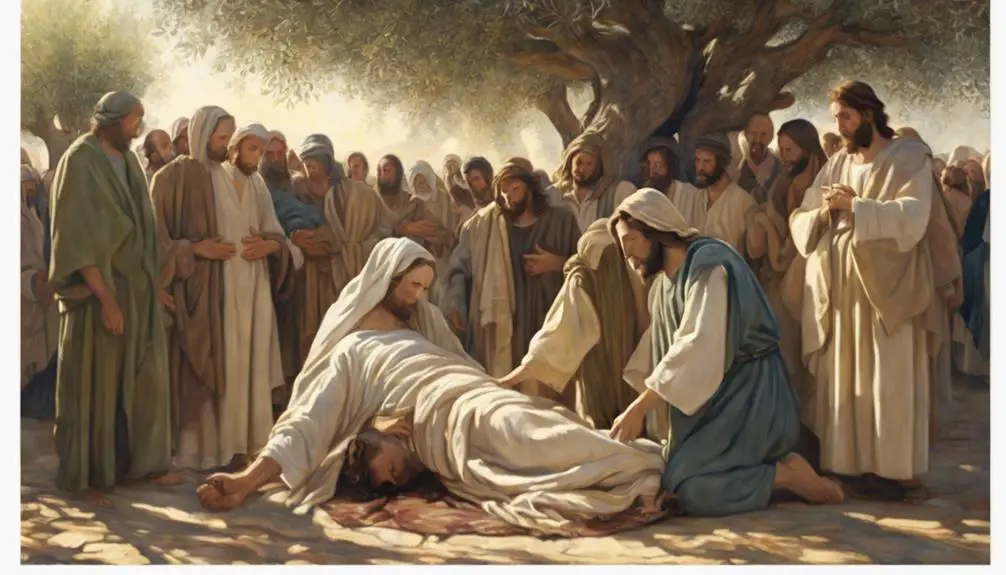
The healing ministry of Jesus, marked by compassion and miraculous interventions, offers profound insights into the nature of divine benevolence and human suffering. You'll discover that each healing event is layered with miracle significance and compassion lessons, illuminating the depth of Jesus' kindness towards those in dire need.
- Miracle Significance: Every healing act of Jesus wasn't just about the physical restoration but also signified the breaking in of God's kingdom, where wholeness and health are the norms.
- Compassion Lessons: Jesus' approach teaches you the value of empathy, demonstrating that true kindness looks beyond societal norms and touches the lives of those often overlooked.
- Personal Transformation: The healed individuals experienced not just physical healing but also emotional and spiritual renewal, highlighting the holistic nature of Jesus' miracles.
- Community Impact: These acts of healing served as a beacon of hope, showing that compassion has the power to transform not just individuals but entire communities.
Analyzing these stories, you're invited to see beyond the surface of the miracles to the heart of Jesus' ministry. His actions challenge you to embody the same compassion and kindness in your interactions, making the lessons of these ancient texts profoundly relevant today.
Frequently Asked Questions
How Do Modern Scholars Interpret the Concept of Kindness in Ancient Biblical Contexts Compared to Today's Understanding?
Modern scholars view kindness in ancient biblical contexts through the lenses of linguistic evolution and cultural relativism. They argue that today's understanding of kindness has shifted significantly from historical interpretations.
Are There Any Recorded Instances of Kindness in the Bible That Are Directed Towards Animals or the Environment?
You're exploring if the Bible records instances of kindness towards animals or the environment. Yes, it does.
Biblical texts emphasize animal stewardship and environmental mandates, showcasing a profound respect for creation.
For instance, Proverbs advises kind treatment of animals, while Genesis mandates humans to steward the earth responsibly.
These examples reflect an ancient understanding of kindness that encompasses all living beings and their habitats, offering insights into a holistic approach to compassion.
How Did Acts of Kindness in the Bible Influence the Legal and Cultural Norms of Contemporary Societies?
You'll find that acts of kindness have deeply influenced contemporary societies, leading to significant legal reforms and cultural shifts.
These actions, rooted in ethical teachings, have shaped how laws are crafted and how communities engage with one another.
They've promoted empathy, respect, and a sense of duty towards others, fostering more inclusive and compassionate environments.
This transformation reflects a profound understanding of kindness as a fundamental societal value.
Can the Concept of Kindness in the Bible Be Linked to Any Specific Religious Rituals or Practices Observed Today?
Yes, the concept of kindness can directly link to religious rituals or practices observed today. You'll find that charity events and communal gatherings often stem from altruistic teachings found in sacred texts.
These practices not only encourage generosity but also reinforce a sense of community and shared responsibility. By participating in these actions, you're engaging in a tradition that has deep historical and spiritual roots, reflecting centuries-old values of compassion and empathy.
In What Ways Do Non-Biblical Historical Sources From the Same Time Period Corroborate the Acts of Kindness Mentioned in the Bible?
You'll find that historical verification of acts of kindness, as described in non-biblical sources, often aligns with biblical accounts. Researchers have identified cultural parallels in ancient texts, inscriptions, and artifacts that corroborate these noble deeds.
This cross-referencing not only enriches your understanding of the era's ethos but also highlights the universal value of kindness across civilizations.
It's a fascinating intersection where history and moral philosophy meet.
Conclusion
In analyzing these biblical narratives, it's evident that acts of kindness transcend mere moral obligations; they embody profound theological imperatives.
The Good Samaritan, Boaz, Joseph, the Widow, and Jesus himself, all demonstrate that true kindness is rooted in empathy, generosity, and forgiveness.
These stories don't just encourage altruism; they challenge us to see the divine in others and act accordingly.
Thus, biblical kindness isn't just an act—it's a reflection of a deeper, universal call to compassion and human connection.


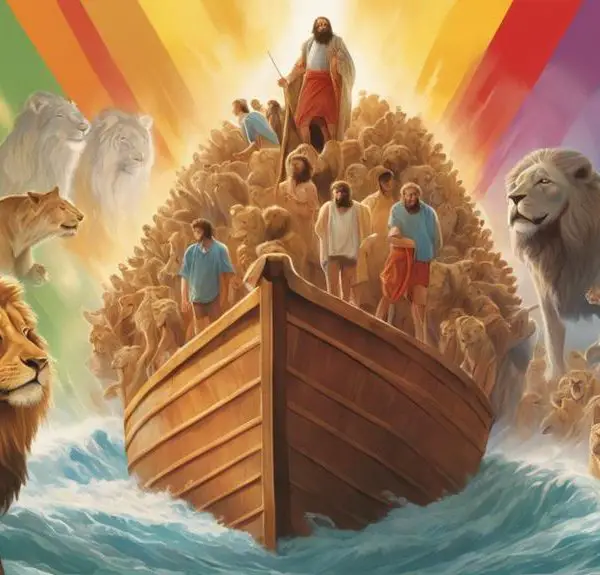
Sign up